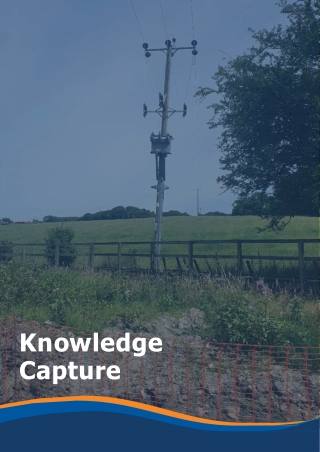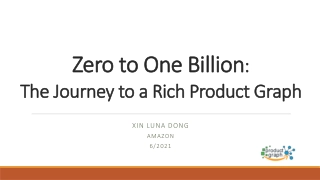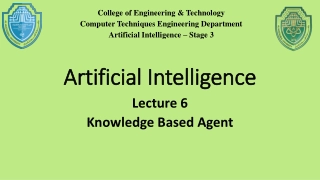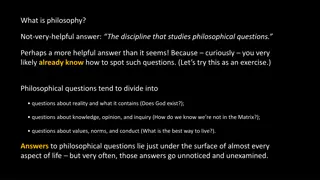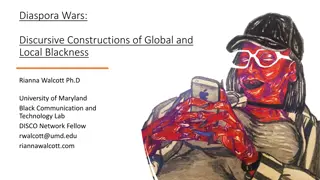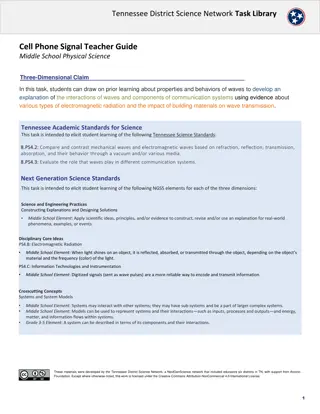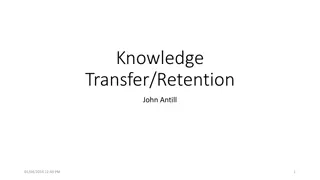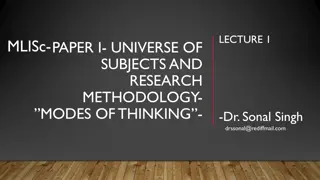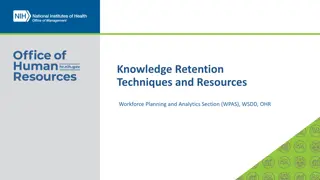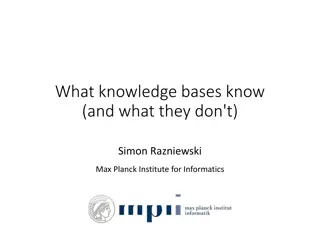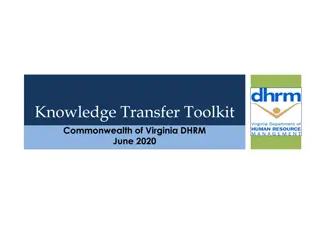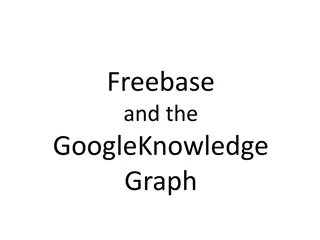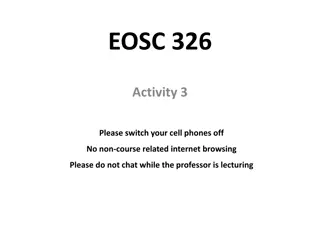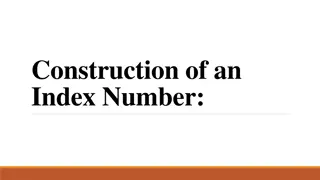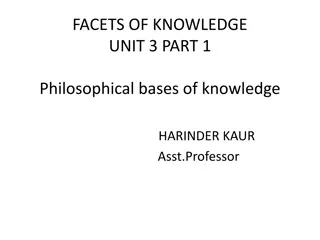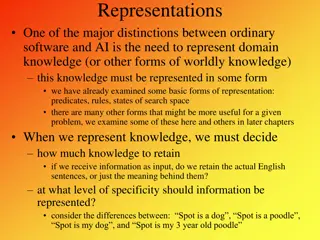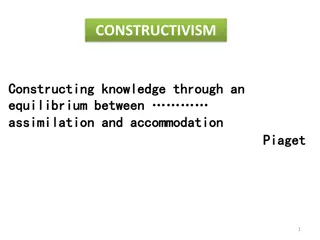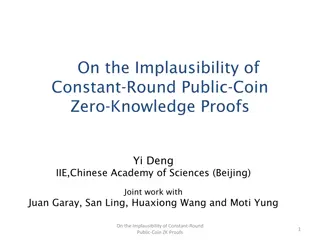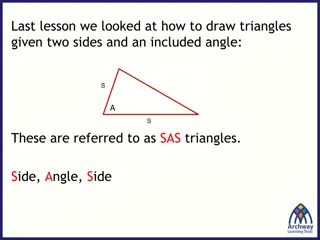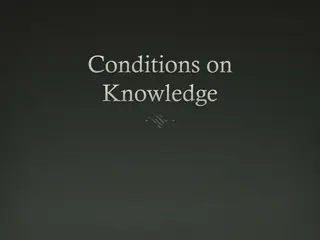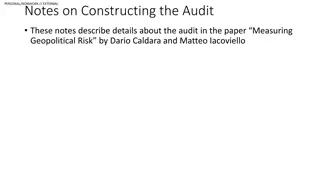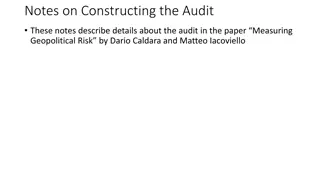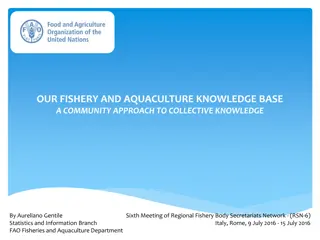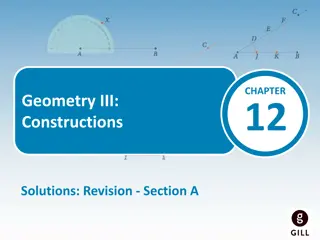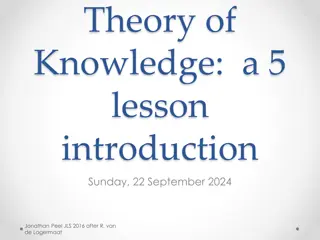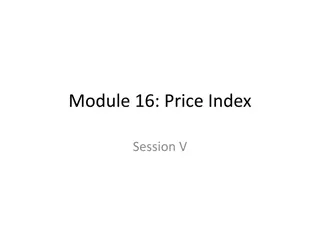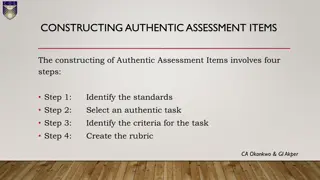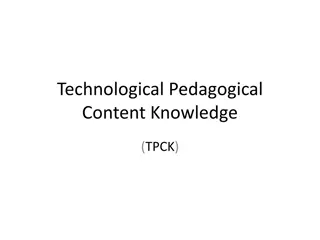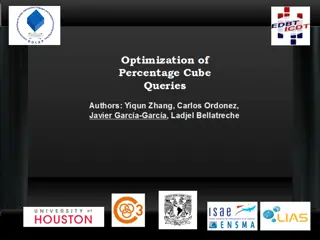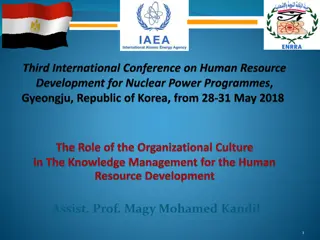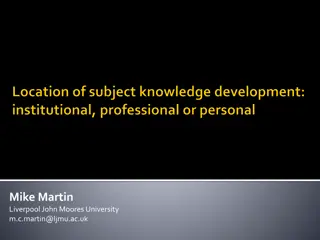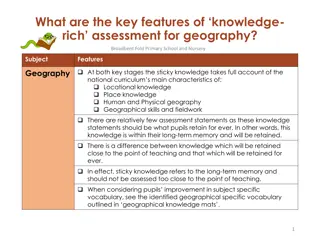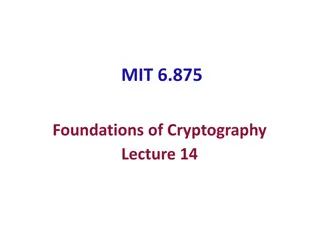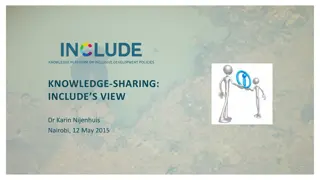Knowledge Capture
Knowledge capture is crucial for organizations to retain valuable expertise and prevent loss of critical knowledge due to employee turnover. Tacit and explicit knowledge play key roles, requiring strategic planning for retention, incentivizing knowledge-sharing culture, and implementing effective st
0 views • 6 slides
Exploring Product and Knowledge Graphs for Enhanced Information Retrieval
Dive into the world of product and knowledge graphs, uncovering the journey to a rich product graph, examples of knowledge graphs for songs, and the mission to provide comprehensive information on products and related knowledge. Discover use cases ranging from information provision to enhancing sear
3 views • 76 slides
Understanding Knowledge-Based Agents in Artificial Intelligence
Knowledge-Based Agents in AI utilize logic and knowledge representation to accept tasks, learn, and adapt to changing environments. Logic plays a crucial role in forming complex world representations and deriving actions based on inference. The central component is the Knowledge Base (KB), represent
4 views • 19 slides
Understanding Knowledge Management: Processes and Frameworks 2. In knowledge management, organizations create, share, and manage knowledge to enhance performance. It involves acquiring different types of knowledge through various means, such as perc
Knowledge Management, Organizational Objectives, Types of Knowledge, Tacit Knowledge, Explicit Knowledge
1 views • 17 slides
Understanding Philosophy: A Guide to Philosophical Questions and Debate
Philosophy delves into questions about reality, ethics, and knowledge. Studying philosophy involves constructing logical arguments to explore and understand these fundamental inquiries deeply. As a student, you'll develop critical thinking skills to engage in philosophical discussions and analyze di
0 views • 5 slides
Discursive Constructions of Global and Local Blackness
Discussions on the importance of dialogue and connectedness in validating knowledge claims, challenges faced by Black women scholars, and the role of style in constructing identity, with insights on humor as a cultural marker.
1 views • 9 slides
Pedagogical Shift in Physical Science: Constructing Knowledge Through Learner-Centered Experiences
There is a significant pedagogical shift in physical science education from viewing science as a fixed body of knowledge to emphasizing the process of constructing knowledge. Learners are now placed at the center stage, engaging in inquiry-based learning, critical thinking, and collaborative interac
3 views • 21 slides
Understanding Waves and Communication Systems in Middle School Science
Task designed for middle school students to explore properties of waves, electromagnetic radiation, and their role in communication systems. Incorporates Tennessee and NGSS standards, focusing on constructing explanations and modeling systems' interactions. Suggestions for classroom use provided to
1 views • 15 slides
Importance of Knowledge Retention in Organizations
Organizations face negative impacts on performance due to the loss of knowledge. Strategies such as exit interviews, mentorship, and knowledge sharing tools are vital for effective knowledge retention. Assessing knowledge retention maturity through various techniques is crucial, aligning with ISO st
0 views • 11 slides
Understanding Modes of Thinking and Knowledge Development
Man's acquisition of knowledge is intricately linked to his ability to think, reason, and perceive. Knowledge is a result of experiences gained through perception, intellect, and intuition. The history of humanity is a story of knowledge acquisition and development, with man at the forefront as the
1 views • 18 slides
Effective Knowledge Retention Strategies in Workforce Planning and Analytics
Retaining knowledge is crucial for organizations to enhance customer service, foster innovation, improve efficiency, and bridge skill gaps. This article explores the significance of knowledge retention, the types of knowledge essential for succession planning, and two effective strategies - the Know
1 views • 10 slides
Exploring Knowledge Base Construction and Commonsense Knowledge in Fiction
Delve into innovative research interests focusing on knowledge base construction using fictional texts as archetypes, taxonomies for constructing knowledge bases, and extraction of commonsense knowledge from diverse sources. Challenges such as sparsity and semantics are addressed through comprehensi
3 views • 48 slides
Your Ultimate Guide to Constructing Windows
Windows are vital in home design, offering natural light, ventilation, and aesthetic appeal. This guide delves into the essential aspects of constructing windows, including types, materials, and design considerations. It highlights the importance of
1 views • 7 slides
Knowledge Transfer Toolkit for Organizational Success
This toolkit, developed by the Commonwealth of Virginia DHRM in June 2020, covers the essentials of knowledge transfer, including its definition, impact, challenges, and management strategies. It emphasizes aligning knowledge transfer with strategic goals, overcoming barriers through leadership supp
2 views • 15 slides
Evolution of Freebase and the Google Knowledge Graph
Freebase was initially created in 2005 as an open shared database of knowledge, later acquired by Google and absorbed into the Google Knowledge Graph. Its approach included crowdsourcing updates and additions, focusing on data rather than text. The schema of Freebase included around 1500 types, 3500
1 views • 12 slides
Understanding Rock Correlation Through Facies and Biostratigraphy
Explore the correlation of rocks using facies and biostratigraphy in Activity 3 of EOSC 326. Learn about constructing biozones, correlating stratigraphic logs, and interpreting paleoenvironments. Discover the significance of fossils B and F in correlation and apply techniques like seriation in const
5 views • 19 slides
Constructing Perpendiculars: Shortest Distance to a Point
Learn how to find the shortest distance from a point to a line, ensuring the path taken is efficient and direct. By constructing a perpendicular from the point to the line, you guarantee the shortest possible route, creating a right angle with the line. Explore the process of constructing perpendicu
2 views • 17 slides
Exploring Methods of Constructing Index Numbers
Various methods of constructing index numbers, such as un-weighted index, simple aggregate method, and simple average of price relatives method, are explained in detail. These methods play a crucial role in analyzing price changes over time and comparing different economic indicators. Each method of
0 views • 6 slides
Facets of Knowledge: Exploring Philosophical Bases and Types
Delve into the philosophical foundations and types of knowledge with insights on local and universal knowledge, theoretical and practical aspects, and school versus out-of-school knowledge. Understand how facets contribute to extended knowledge about attributes within different frames.
0 views • 10 slides
Understanding Knowledge Representation in Artificial Intelligence
In AI, representing domain knowledge is crucial and comes in various forms like predicates, rules, and search space states. Deciding the level of specificity and form of representation is key. Knowledge can be categorized into procedural, domain, and common sense knowledge, available in forms such a
2 views • 32 slides
Understanding Constructivism in Learning
Constructivism is a philosophy of learning that emphasizes the active process of constructing knowledge through a balance of assimilation and accommodation. Learners create their own understanding by reflecting on experiences, engaging in active learning, using language, social interaction, and cont
2 views • 16 slides
Challenges in Constant-Round Public-Coin Zero-Knowledge Proofs
The paper discusses the implausibility of constant-round public-coin zero-knowledge proofs, exploring the limitations and complexities in achieving them. It delves into the fundamental problem of whether such proofs exist, the challenges in soundness error reduction, and the difficulties in parallel
0 views • 20 slides
Constructing SSS Triangles: A Geometric Exercise
Explore the construction of Side-Side-Side (SSS) triangles step-by-step, using compass and straightedge techniques to draw triangles given specific side lengths. Understand the process of constructing triangles without angle information and enhance your geometric skills with practical examples.
0 views • 13 slides
Exploring Epistemology: Understanding Knowledge and Truth
Epistemology delves into the nature of knowledge, understanding, wisdom, and justification, questioning the extent of human knowledge and the different kinds of knowledge. It explores skepticism and conditions on propositional knowledge, discussing whether knowledge implies truth and the debate betw
1 views • 54 slides
Navigating the World of Big Data, Knowledge, and Crowdsourcing
The world has evolved into a data-centric landscape where managing massive amounts of data requires the convergence of big data, big knowledge, and big crowd technologies. This transformation necessitates the utilization of domain knowledge, building knowledge bases, and integrating human input thro
1 views • 5 slides
Insights on Constructing Geopolitical Risk Audit
Details on constructing the audit for the paper "Measuring Geopolitical Risk" by Dario Caldara and Matteo Iacoviello are outlined. It covers the process of building the GPR index, designing the audit sample, and coding articles to identify geopolitical risks discussed in newspapers. The methodology
0 views • 17 slides
Detailed Notes on Constructing the Audit for Measuring Geopolitical Risk
The notes provide insights into constructing the audit for measuring geopolitical risk as outlined in the paper by Dario Caldara and Matteo Iacoviello. It covers the construction of the index, design of the audit sample, reading articles, and coding them based on geopolitical risk references. The pr
0 views • 20 slides
Enhancing Fisheries and Aquaculture Knowledge for Sustainable Development
The Fishery and Aquaculture Knowledge Base, presented at the Sixth Meeting of Regional Fishery Body Secretariats Network, focuses on collective knowledge exchange in the fisheries and aquaculture sector. This knowledge hub offers a wealth of information on various aspects, supporting Sustainable Dev
0 views • 13 slides
Geometry Constructions Revision Solutions Section A
This chapter provides step-by-step instructions and solutions for constructing different geometric shapes like triangles and rectangles. Detailed guidelines are given to construct triangles with specific side lengths and angle measurements, as well as an equilateral triangle. The content also covers
0 views • 19 slides
Exploring the Nature of Knowledge in Theory of Knowledge
Delve into the essence of knowledge with Jonathan Peel's introduction to Theory of Knowledge, pondering on how different disciplines perceive knowledge, the impact of empirical questioning, and timeless wisdom on ignorance and progress. Explore the concept of basic knowledge and its implications, in
0 views • 37 slides
Understanding Modelling Knowledge and Knowledge Representation
Explore the significance of modelling knowledge through knowledge representation, making it explicit, independent, and reusable. Learn why knowledge representation is essential and how it facilitates exchange, query, inference, and visualization. Delve into examples of knowledge application in vario
0 views • 30 slides
Constructing Price Index: General Procedure and Aggregation
The process of constructing a price index involves various steps such as computation of price relatives, aggregation at different levels, selection of base period, and designing data collection methods. Weighted arithmetic mean and simple ratio calculations are used in aggregating price indices. A t
0 views • 31 slides
Constructing Authentic Assessment Items: A Guide in 4 Steps
Constructing authentic assessment items involves four steps: identifying standards, selecting an authentic task, defining criteria, and creating a rubric. Standards are specific skills and knowledge students should gain. Tasks should reflect these standards. Criteria measure student mastery. Rubrics
0 views • 25 slides
Understanding Technological Pedagogical Content Knowledge (TPCK)
Technological Pedagogical Content Knowledge (TPCK) is a framework developed by Punya Mishra and Matthew J. Koehler that integrates content, pedagogy, and technology for effective teaching. TPCK emphasizes the interaction between these three key components to enhance technology integration in educati
0 views • 55 slides
Optimizing Queries and Constructing Percentage Cube in Business Intelligence
Presented at ENSMA, this paper introduces optimized strategies for constructing a percentage cube to enhance processing of complex queries in modern business intelligence. It discusses challenges, comparison between percentage queries and percentage cube, and showcases a data cube analysis of car sa
0 views • 21 slides
Enhancing Human Resource Development through Knowledge Management
Monitoring and improving human performance in nuclear facilities is a key challenge, with knowledge management playing a crucial role in increasing staff competence. Organizational culture influences knowledge-sharing success. Explore the components of knowledge management, its importance in nuclear
0 views • 17 slides
Understanding Subject Knowledge Development in Education
Exploring the complexities of subject knowledge development in education, this study delves into areas such as students' existing knowledge, competencies, and the role of institutions in shaping knowledge acquisition. The focus lies on personalizing knowledge to individual needs rather than a fixed
1 views • 22 slides
Key Features of Knowledge-Rich Assessment in Geography at Broadbent Fold Primary School
Broadbent Fold Primary School emphasizes sticky knowledge in geography assessment focusing on locational knowledge, place knowledge, human and physical geography, and geographical skills. Assessment statements aim to facilitate long-term retention of knowledge, vocabulary acquisition, and fieldwork
0 views • 8 slides
Zero-Knowledge Proofs in Cryptography
Exploring zero-knowledge proofs in cryptography, this content delves into interactive protocols, perfect zero-knowledge definitions, and the QR protocol's honest verifier and malicious verifier zero-knowledge theorems. It discusses how simulators work to maintain zero-knowledge properties and the si
0 views • 37 slides
Knowledge Sharing and Inclusive Development Policies
Knowledge Platform on Inclusive Development Policies (INCLUDE) focuses on enhancing research utilization in policy-making to foster more inclusive development. It was established in 2012 with the aim of bridging the gap between research and policy processes in African countries. INCLUDE engages expe
0 views • 8 slides
